Author: Ann Glusker
Library’s Wikipedia Edit-a-Thon: Coming Soon (3/10) to a Screen Near You!
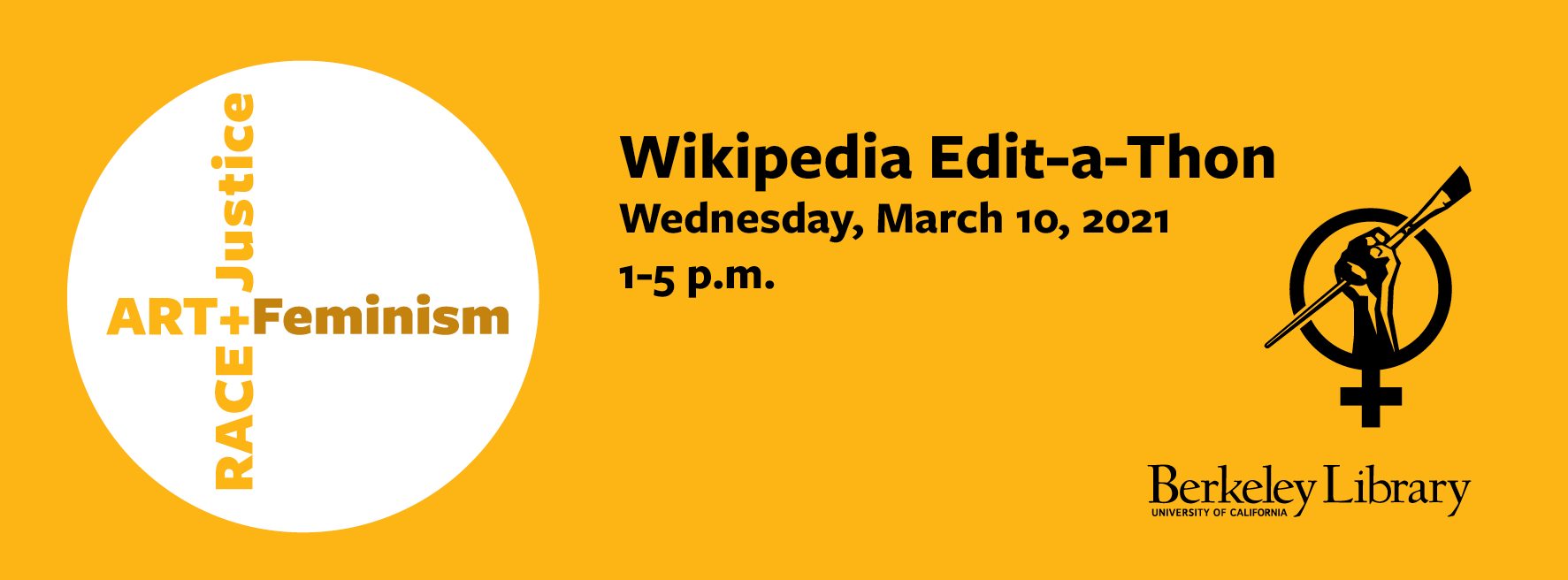
For many of us in the library, last year’s Wikipedia Edit-a-Thon on March 4 was the final program we held in person before the pandemic lockdowns (we actually wondered at the time whether attendance would be down due to the spread of the virus, but we had a great crowd).
Happily for us, the edit-a-thon, which is an event that gathers people together to expand and improve on the amazing information resource Wikipedia, can easily transition to an online format! The National Network of Libraries of Medicine has been holding national online edit-a-thons for years, and there are many other wonderful offerings, themed and general, to take advantage of online (check out this set of events “Honoring Indigenous Writers” from the University of British Columbia).
So, this year, our edit-a-thon will be virtual. Please come edit with us on Wednesday, March 10, from 1:00-5:00 PM! (or any portion of that time that works for you) We’ll use Zoom as a way to hold our guest speaker session and workshops on how to edit, and we will even have breakout rooms for the various editing preferences and needs of attendees. More information and the schedule can be found here; the only thing you need to do is register using this form (in order to get the Zoom link), and show up online on the day! (It would also be great, if you want to actually edit, to set up your Wikipedia account in advance)
And, about the guest speaker aspect of the event—this year, we are thrilled to offer a two-hour Wikipedia workshop (from 1:00-3:00 PM) created and led by Dr. Alexandria Lockett, from Spelman University in Atlanta, GA. Dr. Lockett will discuss how both new and experienced editors can meaningfully contribute to underrepresented knowledge of Wikipedia through alternative research practices.
Questions? Feel free to email us at editathon@lists.berkeley.edu, and we hope to “see” you on March 10!
Love Data? Join Us During Love Data Week 2021, Feb 8-12!

Since our Love Data Week invitation post last year, the COVID pandemic has created a new world— and amazing new opportunities and challenges related to data. Just a peek at data.berkeley.edu (the portal for Berkeley’s Computing, Data Science, and Society Division) shows that data-related research during this past pandemic year, even with its intense and difficult challenges, has revealed new insights. Check out “Pandemic provides real-time experiment for diagnosing, treating misinformation, disinformation”.*
So, it’s fitting that Love Data Week 2021 at Berkeley, hosted by the UC Berkeley Library in partnership with Berkeley’s Research IT department, is focused on the kinds of issues we are confronted with in a wholly-online research environment. Join us on Tuesday for a session on ethical considerations in data, most definitely a concern with many of Berkeley’s researchers looking at issues related to COVID; on Wednesday for a talk on cybersecurity (aimed at graduate researchers but all are welcome); on Thursday for another security-related workshop, “Getting Started with LastPass & Veracrypt”; and on Friday for an introduction to Savio, Berkeley’s high performance computing cluster. Please click on this link for information on these, and registration links!
Questions? E-mail LDW 2021 at researchdata@berkeley.edu . And, if we’ve whetted your appetite for data and more data, take a look at the University of California-wide Love Data Week offerings. If you’ve ever wondered what an API is, or want a quick intro to SQL, or even just want to know what the acronyms stand for, there are these sessions and more!
* The same page makes it clear that data is for everyone; check out “I Am a Data Scientist”, about a student who came to Berkeley as an English major and discovered how data can “shed light on larger-scale questions”, and “Translating Numbers Into Words: The Art of Writing About Data Science”, featuring three Berkeleyites who are getting the word out about data.
Pandemic Pivot: Data Engagement — from Berkeley, not Gothenburg
So many of us have a dream that didn’t take place this year. Mine was to go to the Volvo Museum in Gothenburg, Sweden. I’m a big Volvo fan: here’s my 1992 wagon, who the mechanic said wouldn’t make it from Seattle to Berkeley when I moved here. He was wrong, she flew into Berkeley in style. She’s a champ.

But, I digress! The reason I was due to be in Gothenburg at all was to give a talk at the 2020 IASSIST (International Association for Social Science Information Service and Technology) conference there in May, but of course like so much else the conference was canceled. I was pretty disappointed, especially since this was my chance to take a presentation I’d given for public librarians in 2017 and re-envision and reinvigorate it for academic librarians in 2020.
I got very lucky though…in mid-March, just as conference cancellation news came through, and the Bay Area’s shelter-in-place was declared, a colleague encouraged me to submit something for consideration to the ICPSR (Inter-university Consortium for Political and Social Research) Data Fair, already slated to be held online in the fall.
Reader, I pivoted! I was able to take the proposal for the Gothenburg lightning talk (about 7 minutes), and expand it into a proposal for an hour-long webinar, online from Berkeley. It was accepted! As I started to work on it, I discovered I had perhaps promised I’d talk about approximately three hours’ worth of material, so condensing it was a challenge—perhaps because it is on a subject I feel passionately about—“Data Engagement for the Data-Hesitant Librarian”. My strong belief is that many of us, and I tend to think especially about librarians, are led to believe that data is some big, mysterious, and daunting mountain we don’t want to climb, when actually we already have much more skill, comfort, and experience working with it than we think.
So, I tried to create a talk that had some fun in it, and some data-related resources that are practically begging to be explored. Interested in how we can combat misinformation? Check out callingbull.org, by the authors of the new book Calling Bull: The Art of Skepticism in a Data-Driven World. What about critical data literacy and data justice? Take a look at this guidebook from the Data Justice Lab, complete with interactive learning tools. Perhaps a recipe from The Library Assessment Cookbook appeals? Or maybe you just want to learn more about the Burning Man event, from the Burning Man Census data they collect each year.
Whatever your interest, geek out proudly! You can find the talk here (Is.gd/DataEngage_Talk —check out the other ICPSR Data Fair talks while you’re there) and the slides here (Is.gd/DataEngage_Slides). I hope you find something to interest and engage you, and I’d love to hear what you think—feel free to drop me a line at glusker@berkeley.edu!

An Iconic Gift
This post is by Environmental Design Library librarian David Eifler; if you haven’t seen him, or his wonderful library (one of more than 25 on campus), you can check them out by joining him on this Virtual Tour.
**
While I was in high school, my small businessman dad came home one evening with a book. Although he had a natural curiosity and often read the encyclopedia for pleasure, I’d never seen him as excited about the written word as when he brought home The Last Whole Earth Catalog: Access to Tools – the one with the shadowed view of the “blue marble” on the cover. Now considered by many a precursor to the World Wide Web, it was a compendium of tools and books to improve the planet. Decades later, when I arrived to the Environmental Design Library (ENVI), I was pleased to find it and other editions in our collection. Librarian Elizabeth Byrne proudly told me that its author, Stewart Brand, had written a classic, How Buildings Learn: What Happens After They’re Built, while doing the research in our library.
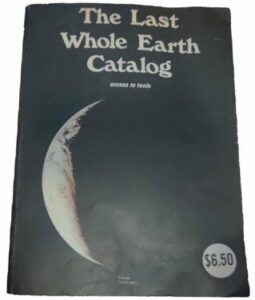
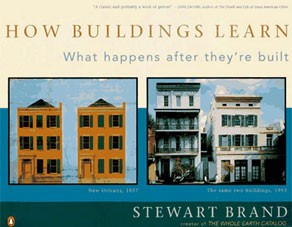
So, I was thrilled when Brand contacted me in late November and asked if ENVI would accept approximately 200 books used to write How Buildings Learn. He’s working on a new book and needed to purge his library of volumes from past projects. The founder of the WELL (Whole Earth ‘Lectronic Link) with Dr. Larry Brilliant (now a CNN COVID-19 expert) and CoEvolution Quarterly met me at his Sausalito office on a sunny December morning and gave me 11 boxes of architectural books. The Library got the books, and I had the great pleasure of meeting a national icon.
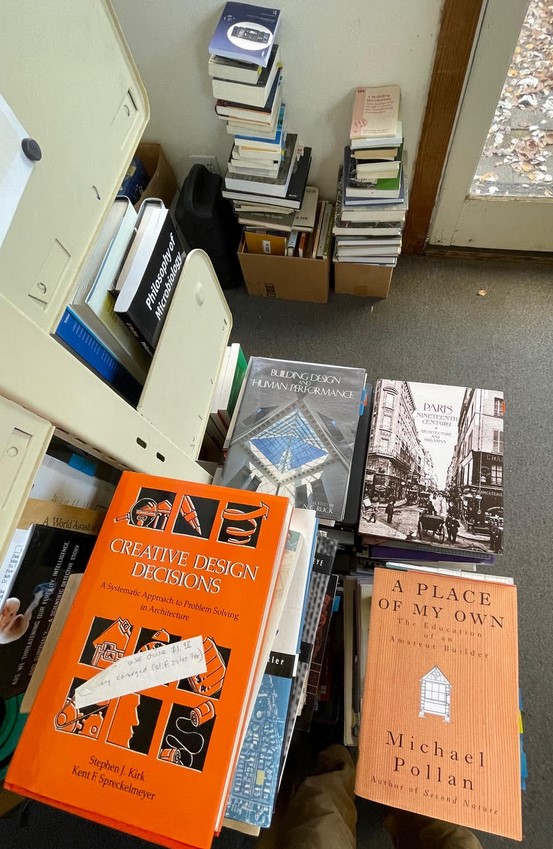
“Checking the Boxes” – A panel on race, ethnicity, and the Census
Although we don’t always think of it that way, one federal government program that affects each of us in the United State is the decennial census. And among the challenges of many kinds that a pandemic has brought us, its effects on gathering good quality census data is high on the list.
Earlier this year, the Library hosted a well-attended (physical) exhibit related to the census, Power and the People: The US Census and Who Counts (which can still be experienced online). Related to the exhibit, we were on board with our plan to host a panel of campus experts on the contested race and ethnicity questions in the census, and how they’ve shifted over time…. Until March 17, when the Bay Area went into a shelter-in-place order and the program had to be postponed. But last month, thanks to a persistent team, generous panelists, and the wonders of Zoom, we were thrilled to able to present the panel at last, online!
The program, titled Checking the Boxes: Race(ism), Latinx and the Census, featured three UC Berkeley experts on racial and ethnic categorizations in the census. Cristina Mora (Associate Professor of Sociology and Chicano/Latino studies), Tina Sacks (Assistant Professor, School of Social Welfare), and Victoria Robinson (Lecturer and American Cultures Program Director, Department of Ethnic Studies) were joined by our moderator, librarian Jesse Silva, for presentations and a lively Q&A.
Professor Mora started the program off with the information that “ethnic and race categories are political constructs… They are not set-in-stone scientific markers of identity or genetic composition.” She noted that since the census counts are directly related to funding, communities have a vested interest in getting accurate and complete counts, but this can be very difficult for groups and areas that are designated Hard to Count. Professor Sacks continued by emphasizing the ways in which census-driven funding allocations can affect people in poverty and those in social safety net programs. She also noted the intersections shown by census data between race and place, such as areas with a substantial number of incarcerated people. Finally Professor Robinson added background and context by discussing the site racebox.org, which shows the history of the race questions on the census from 1790 onwards, and which illuminates the changes in the cultural and social conceptions of what race is and how it can be measured.
The program concluded with an animated question and answer period, which included Professor Mora’s elaborating on the differences between racial and ethnic categories, Professor Sacks (who has actually been a census enumerator) discussing the challenges of counting the homeless population, and Professor Robinson revisiting the question of incarceration and the Attica problem: “[Incarcerated people’s] residence is considered to be a prison. That’s not their home, and the relationship then to the power…in the communities that they [aren’t from], that’s the Attica problem.”
Of course, this summary doesn’t do justice to the range and depth of the issues discussed. If you missed this program, or would like to see it again, check it out on the UC Berkeley Library’s YouTube channel!
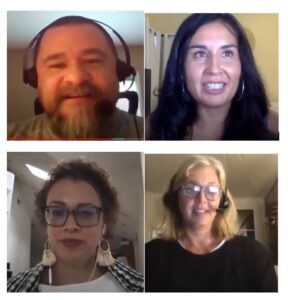
Come Edit with Us! (at the Wikipedia Edit-a-Thon, 3/4/20)

Umberto Eco, author of The Name of the Rose, said, “The cultivated person’s first duty is to be always prepared to rewrite the encyclopedia.” But, in the case of Wikipedia, we actually get to write the encyclopedia! If you are interested in Wikipedia as a phenomenon and what happens behind the scenes, in learning to edit, and/or in improving the quality and diversity of content in this important resource, join us at the upcoming Art + Feminism + Race + Justice Wikipedia Edit-a-Thon.
Why is this so important, anyway? It’s because Wikimedia’s race and gender trouble is well-documented. While the reasons for the gap are up for debate, the practical effect of this disparity is not: content is skewed by the lack of participation by women and underrepresented groups. This adds up to an alarming absence in an important repository of shared knowledge, which many groups are starting to address.
Art+Feminism is a national campaign improving coverage of cis and transgender women, non-binary folks, feminism and the arts on Wikipedia, and at UC Berkeley we have teamed up with the American Cultures program’s Race+Justice edit-a-thon. Edit-a-thons are a powerful way to address Wikipedia’s gaps in content. The Library is also joined in sponsorship of the event by 150 Years of Women at Berkeley, and suggested editing needs will include topics related to Berkeley alumnae of note.
So, join us in 405 Moffitt Library on Wednesday, March 4 between 11:00am and 5:00pm for an all-day communal updating of Wikipedia entries. Drop in any time! We will provide tutorials for the beginner Wikipedian, reference materials, and refreshments. Check out the schedule at bit.ly/wiki-berkeley for timing of informative talks, instruction sessions, and more. Set up your Wikipedia editing account in advance, or we can help you on the day. Bring your laptop, power cord and ideas for entries that need updating or creation! For the editing-averse, we urge you to stop by to show your support. People of all races and gender identities are invited to participate.
See you there!
NOTE: A Cal ID card is required to enter Moffitt, so those without a Cal ID card need to RSVP to attend the event by March 3.
The Library attempts to offer programs in accessible, barrier-free settings. If you think you may require disability-related accommodations, please contact us.
Feb 10 – 14: Love Data Week 2020

Berkeleyites have loved data for a long time now. Way back in 2000 (20 years ago is EONS in the dataverse!), the American Association for Public Opinion Research gave an award to the Berkeley creators of what became SDA, or Survey Data Analysis, an early online data tool still used today, and the best thing since sliced bread if you are a data geek. In 2010, Berkeley researchers teamed with Alice Waters from Chez Panisse, using data to show how kids make better choices about nutrition if they grow their own food. And check out this 2014 book review from the School of Information’s Data Science program, on the book Data: A Love Story, in which an enterprising online dater applies data science to her quest and (spoiler!) finds a lasting match.
So, it’s not at all surprising that UC Berkeley has an affection connection with the annual event Love Data Week, which has been a growing worldwide phenomenon since it started in 2016. Love Data Week (LDW) began, as the site mentions, “to raise awareness and build a community to engage on topics related to research data management, sharing, preservation, reuse, and library-based research data services.” Berkeley has always offered a range of events and chances for participation during LDW, and this year is no exception.
On Monday, there will be an “Introduction to Savio” workshop, introducing you to the campus Linux high-performance computing cluster. On Tuesday, there will be a session on Security Incident Handling (titled, tellingly, “Not If, When: Data + Information Security”). Wednesday brings an introduction to the venerable and vast social science data repository, ICPSR (Inter-university Consortium for Political and Social Research), and Thursday’s offering is a talk by Daniella Lowenberg, Product Manager for the open data publishing platform Dryad (which allows all UC Berkeley researchers to archive and publish their data).
More information about each of these sessions is available on Berkeley’s Love Data Week 2020 page; note that all UC Berkeley staff, students and faculty are welcome, and refreshments will be provided at all sessions!
As you see, there’s something for everyone, and it’s totally OK if you don’t love data— YET! As they say on the Love Data Week site, “We believe research data are the foundation of the scholarly record and crucial for advancing our knowledge of the world around us. If you care about research data, please join us!”
“Teaching, Learning and Creating Change with Data”–a Census-Focused Library and American Cultures Event
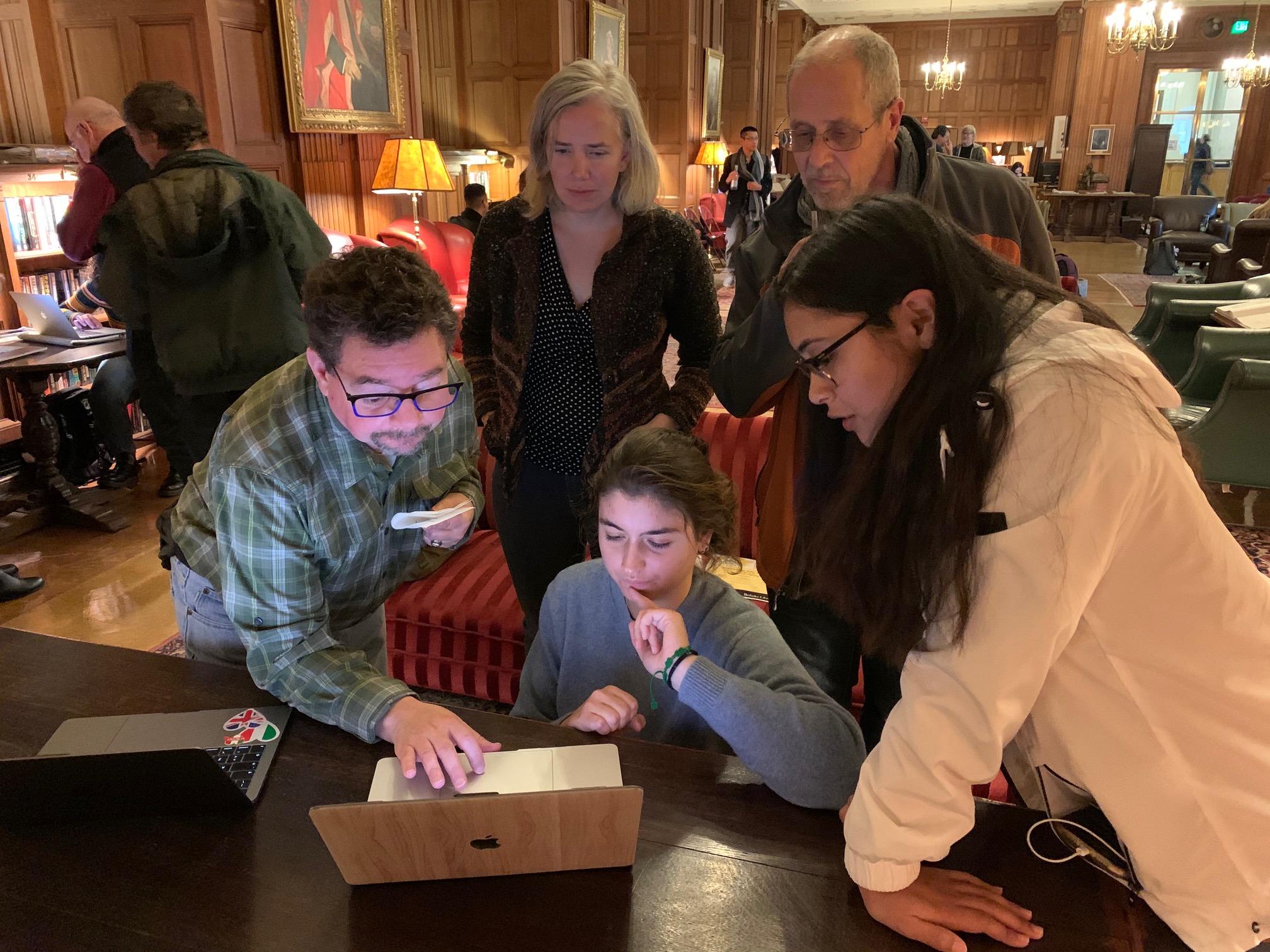
At Berkeley, every undergraduate student must satisfy an American Cultures (AC) requirement. From the American Cultures site: “American Cultures courses are uniquely designed to critically engage in important issues within the United States by helping students develop a deeper understanding of race, culture, and ethnicity in the context of American society.” This long-standing requirement has led to some amazing projects and also some really creative ways of engaging students. And, even if a class is sponsored by, say, the sociology department, the students may be from a wide range of disciplines.
Having just launched “Power and the People: The U.S. Census and Who Counts”, the library’s exhibit on the census (just in time for the 2020 count), its curators were looking for exciting ways to bring census data to life, as part of a kick-off event. We learned about how two American Cultures classes (Sociology 130AC, “Social Inequalities: American Cultures” and Sociology 146AC, “Contemporary Immigration in Global Perspective”) involve students with the census by incorporating census data into projects—and a program was born!
The program held earlier this week, called “Teaching, Learning and Creating Change with Data: The Census and American Cultures”, featured faculty and student presenters outlining and showing their work in the inviting space of the Morrison Library. After short talks by Victoria Robinson, American Cultures program director, Irene Bloemraad, Sociology department and director of the Berkeley Interdisciplinary Migration Initiative (BIMI), and Joanna Reed, Sociology department, students presented their work, the heart of the event. Six Sociology 130AC students showed, on laptops, how they used census data to complement their field work looking at neighborhood characteristics for assigned census tracts along the number 18 AC Transit bus route. Five Sociology 146AC students showed, on conference-type posters, how they used census data along with their investigations of immigrant services in two Bay Area cities (Richmond and Santa Rosa), to map availability of services in areas of greatest need and look for service gaps (in fact, some of this work contributed to a BIMI report). [post continues below photos]
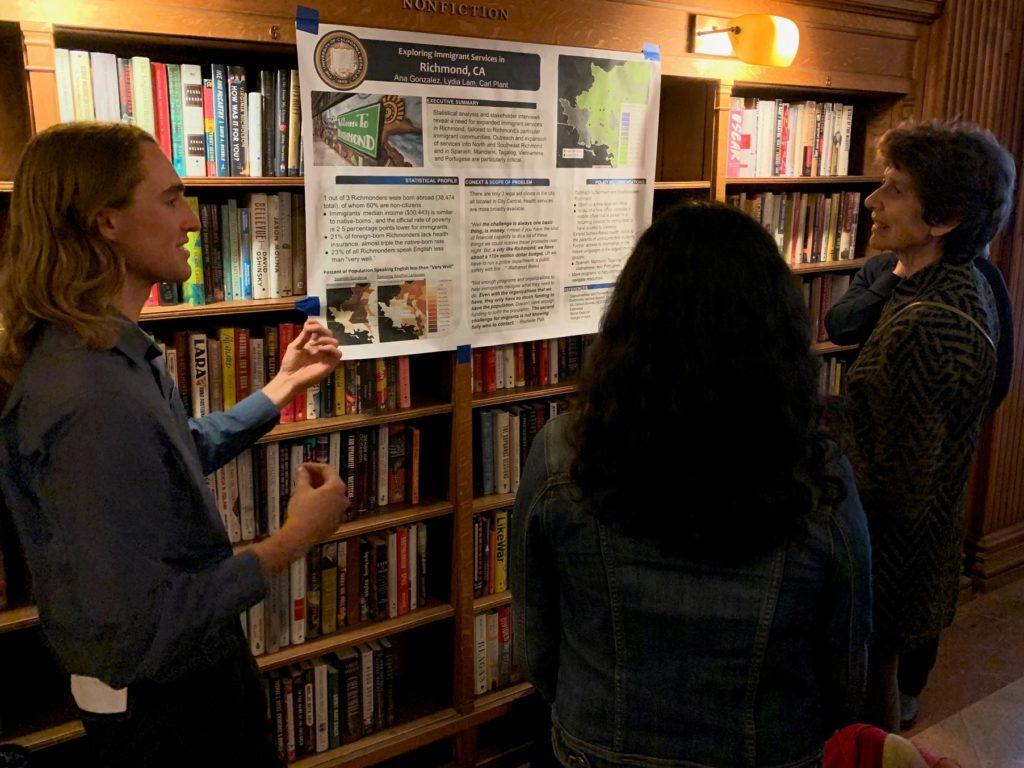

The hallmark of the event was the completely engaged atmosphere of conversation and ideas that resulted from the connections between the students and attendees, and between the broader context of how census data shapes and helps us understand the country we live in. This post is full of photos, because they are what really convey how exciting it was to see what the census can offer to our research and our lives, and to make the case of how important it is for each of us to be counted.
P.S. Don’t miss our second event, a panel featuring renowned experts on race/ethnicity and the census, Cristina Mora, Michael Omi, Taeku Lee, and Tina Sacks, on March 19, 2020, same time (5 pm), same place (the Morrison Library)
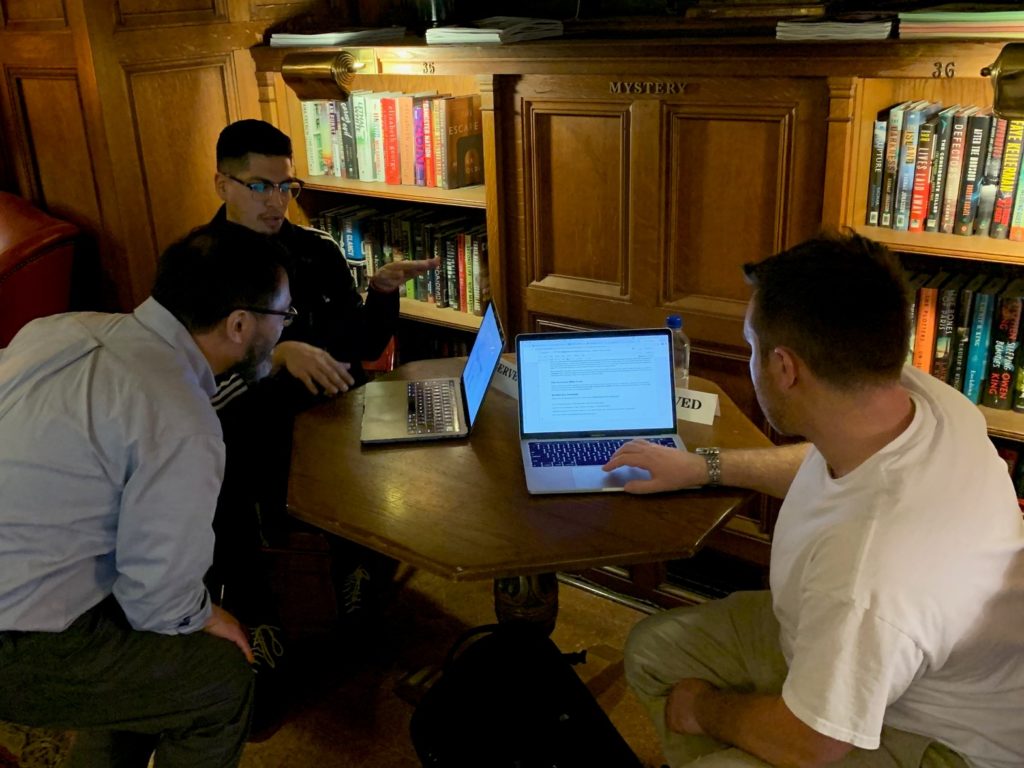
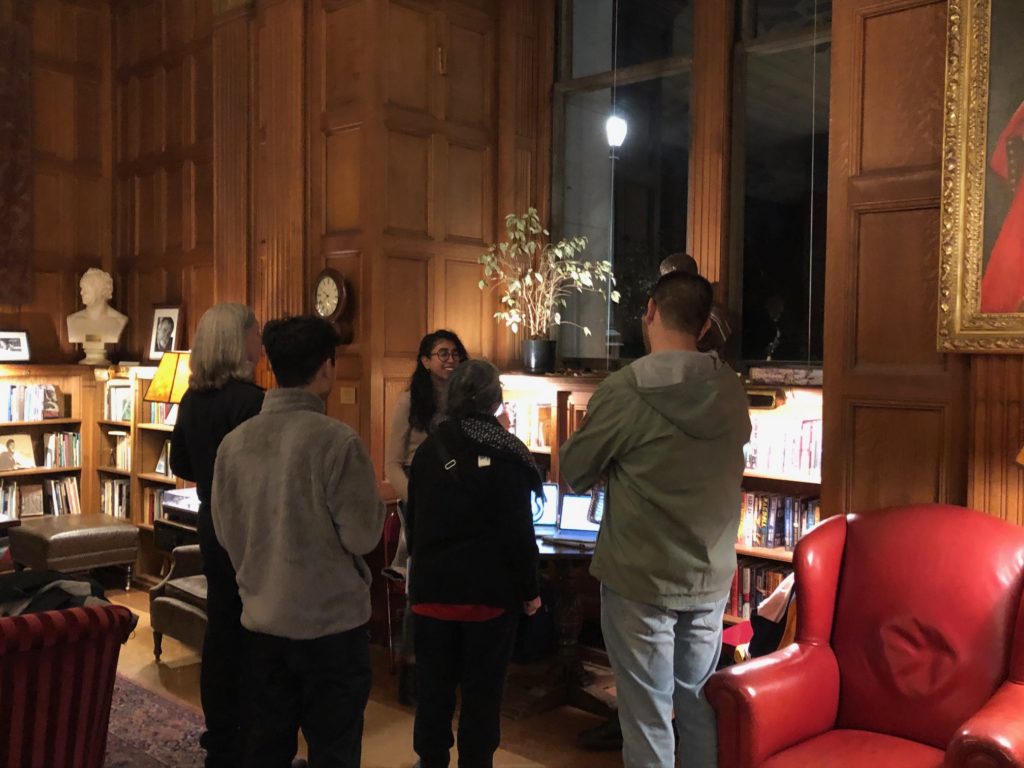
An Assembly of Janeites
I’m not sure what the collective noun is for Janeites* (the term popularized by Rudyard Kipling in his short story by that name) to denote admirers of the Georgian-era British novelist Jane Austen, but assembly will do as well as anything! The recent Annual General Meeting (AGM) of the Jane Austen Society of North America (JASNA), held in Williamsburg, VA was indeed an assembly of Janeites, and a fascinating one, attended by this UC Berkeley librarian (incidentally, a JASNA life member from long before the Colin Firth wet shirt scene).
JASNA has upwards of 6,000 members worldwide, and an impressive 850 attended this AGM (which filled up within five minutes of going live online), from every US state but 3 and every continent but Antarctica. The AGM is an agreeable panoply of lectures (some popular, but mostly academic, including three excellent plenary addresses), special events such as tours and concerts, and a ball and promenade. To say it’s a cross between a ComicCon-like event and a discipline-specific scholarly gathering doesn’t do it justice—there is some indefinable aspect added by the focus on the Georgian/Regency era and the passion for one ironic, wise, delectable, insightful, and compassionate author. And the period-appropriate garb doesn’t hurt, especially when its background is Colonial Williamsburg, a veritable time capsule itself.
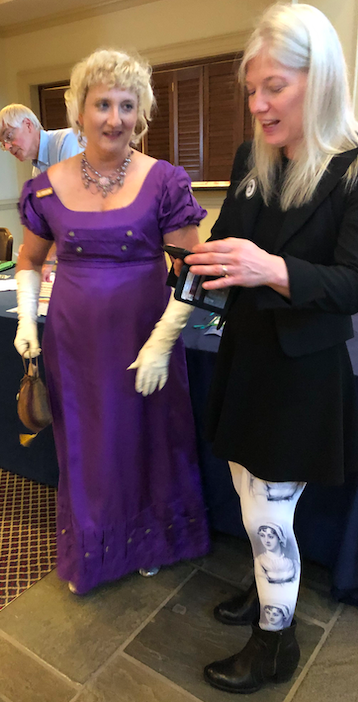
Herewith some highlights of this year’s AGM, for you readers who are interested in a glimpse of this delightful conclave:
—Let’s begin with some academic cred! Here are the lists of the conference’s breakout sessions and plenary addresses, complete with presenters’ bios. Nothing if not majestic scholarship on show!
—Continuing with the academic theme, my favorite part of the entire conference (what can I say? I’m a librarian!) was the tour and open house of Special Collections at the library of the College of William & Mary. William & Mary is second only to Harvard University as the oldest higher education institution in the US, was founded in 1693, and is the only one founded by royal charter, from, you guessed it, co-regnants William and Mary. For more detail on the tour, see this piece which appeared in William & Mary news. Overall, it was just amazing to see the depth of the holdings, and those related to Jane Austen in particular. Some of the most notable are thanks to an American Janeite, George Holbert Tucker, whose extensive and meticulously documented collection is now held at William & Mary. At the same time, there were many other period treasures on display, among them this donation of a lock of Queen Mary’s hair.
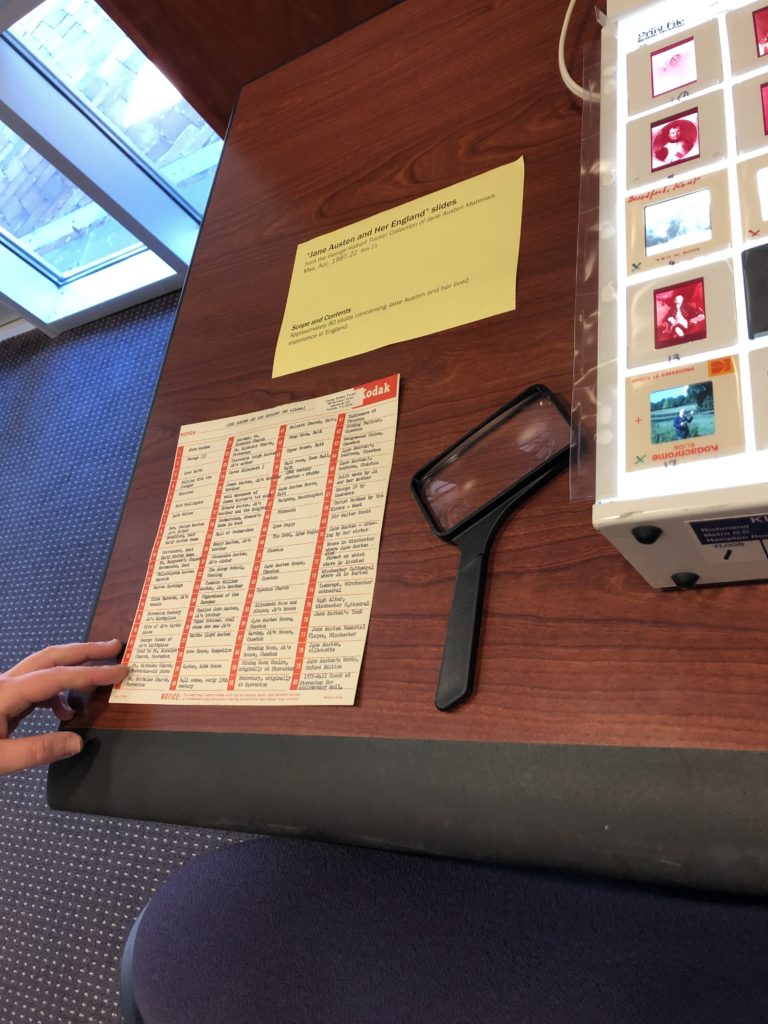
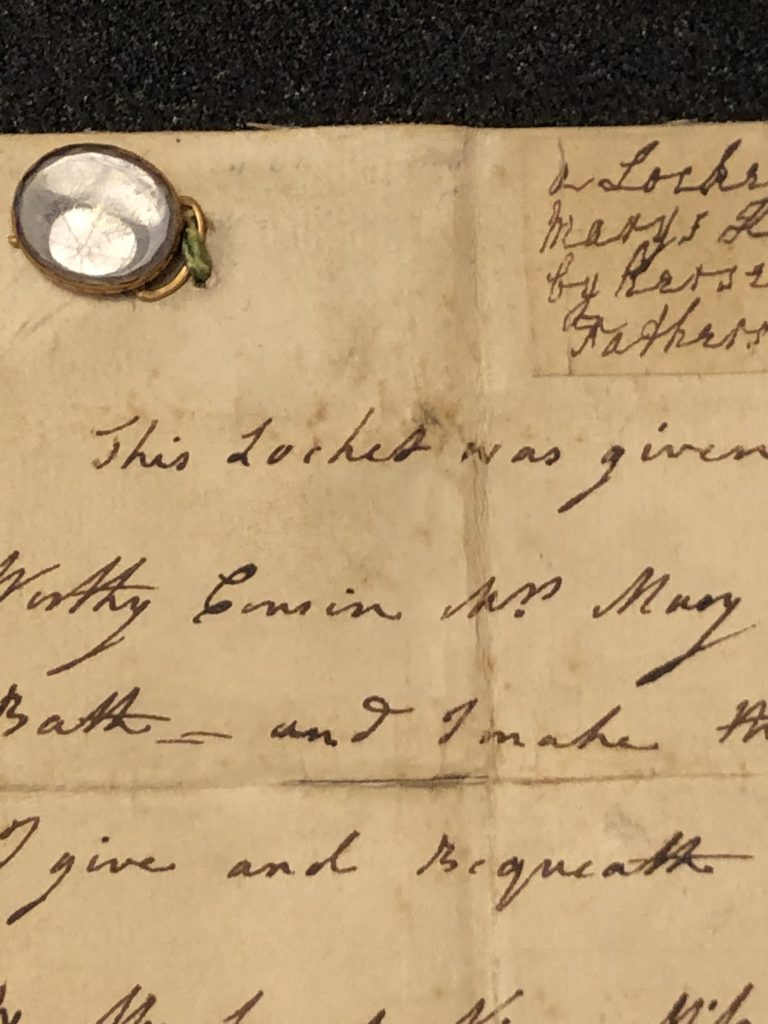
—Of course, there were also tours of Colonial Williamsburg. Of special interest was the home of George Wythe (the original structure still stands), with whom Thomas Jefferson lived and studied law for three years. John Marshall, fourth Chief Justice of the Supreme Court, also lived in Williamsburg and studied with Wythe; in addition, Marshall liked reading Jane Austen! He wrote of her: “Her flights are not lofty, she does not soar on an eagle’s wings, but she is pleasing, interesting, equable, yet amusing.”
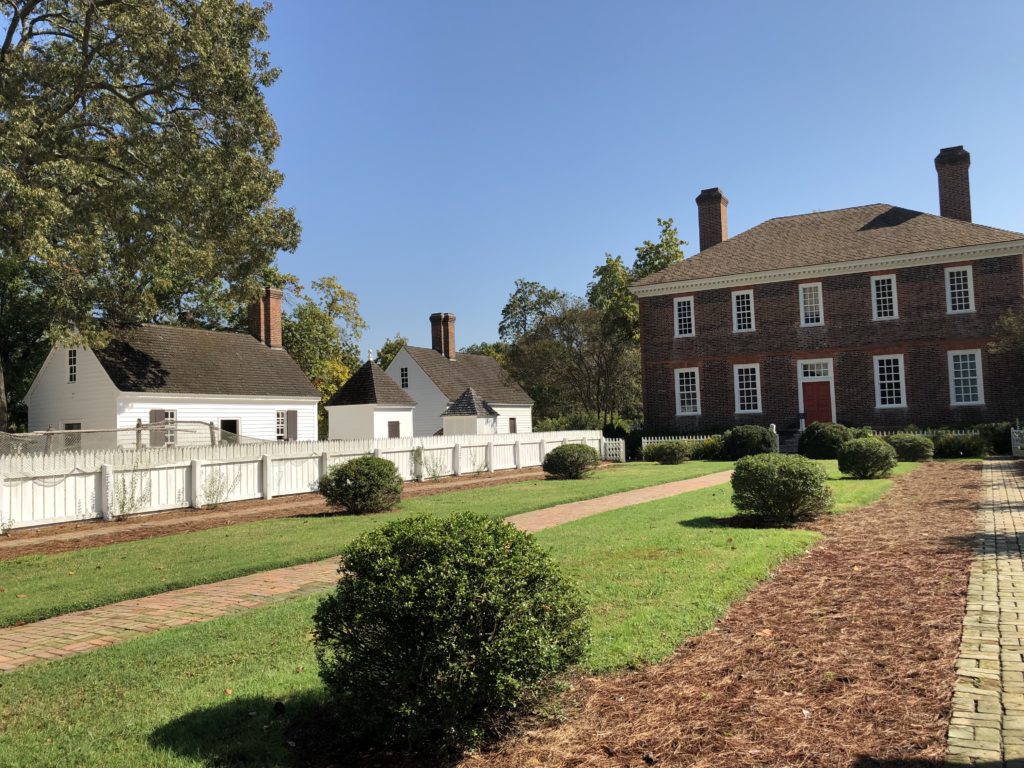
Also, being a librarian, I was very interested to see a demonstration of colonial-era typesetting and printing (unfortunately, the bookbinding demonstrations were not happening when I was there):
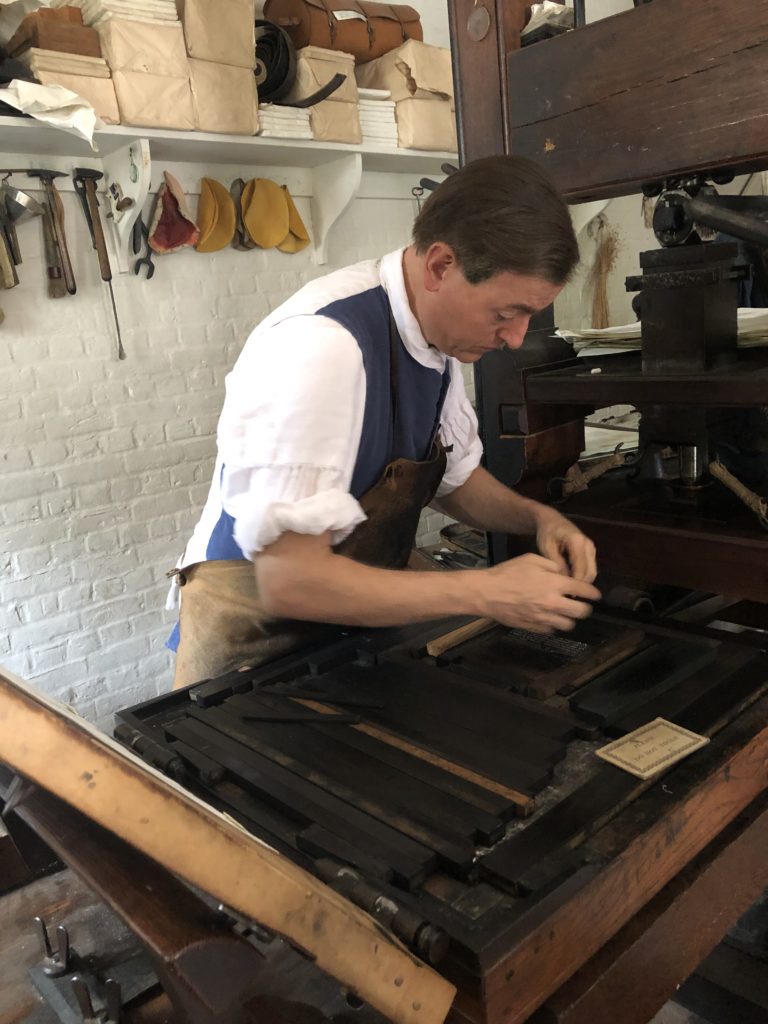
—The promenade and ball are the hallmarks of any AGM. After dinner, the entire assembly does a promenade, in their finery for the ball, around any location at which they happen to be meeting (when I attended an AGM in Washington DC, the promenade took place on the escalators connecting four levels of the hotel— quite a sight). This time, we strolled at dusk to the Governor’s Palace, led by four torch bearers (with modern protective gear—those torches were huge!) where an actress told us period-appropriate ghost stories. Then we gathered for the ball, to dance and drink and carouse. The music was provided by a small string ensemble, and a caller with the calmest voice imaginable led the lines of dancers in the sometimes-intricate moves. Luckily everyone was good-humored!

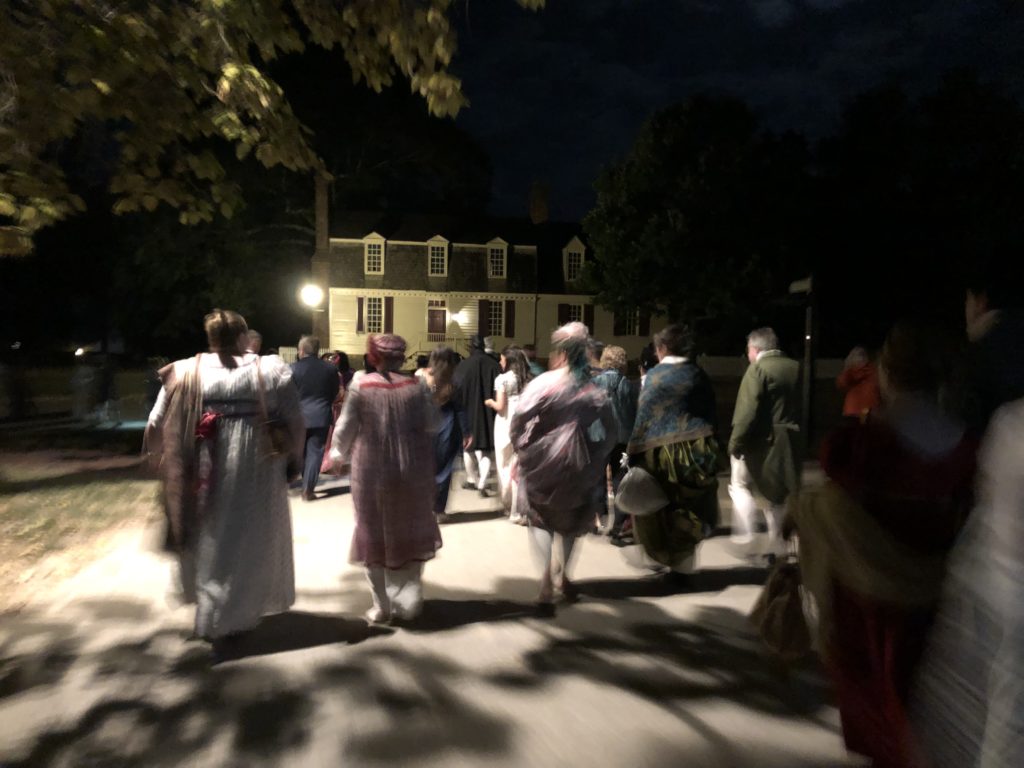
—The attention to dress is something that has always marked an assembly of Janeites (as it marked the interests of many of Jane Austen’s characters, at a time when distinctions in dress spoke more loudly than words). At the conference, this could be seen in both modern expressions (as in this T-shirt with its reference to Lady Catherine de Bourgh’s admonishment of Elizabeth Bennet in Austen’s Pride and Prejudice), and in scrupulous care with period detail in the many outfits worn by attendees, especially at the ball. In Colonial Williamsburg, where the park interpreters are dressed in colonial era period-appropriate apparel (mostly from the second half of the 18th century), conference attendees in Georgian/Regency attire (from the late 18th to early 19th centuries) didn’t stand out as much to our modern eyes. However, they would have stood out in the late 1700s, when wearing rich and patterned clothing identified one as a loyalist to the crown, and was positively unpatriotic (patriots wore homespun).
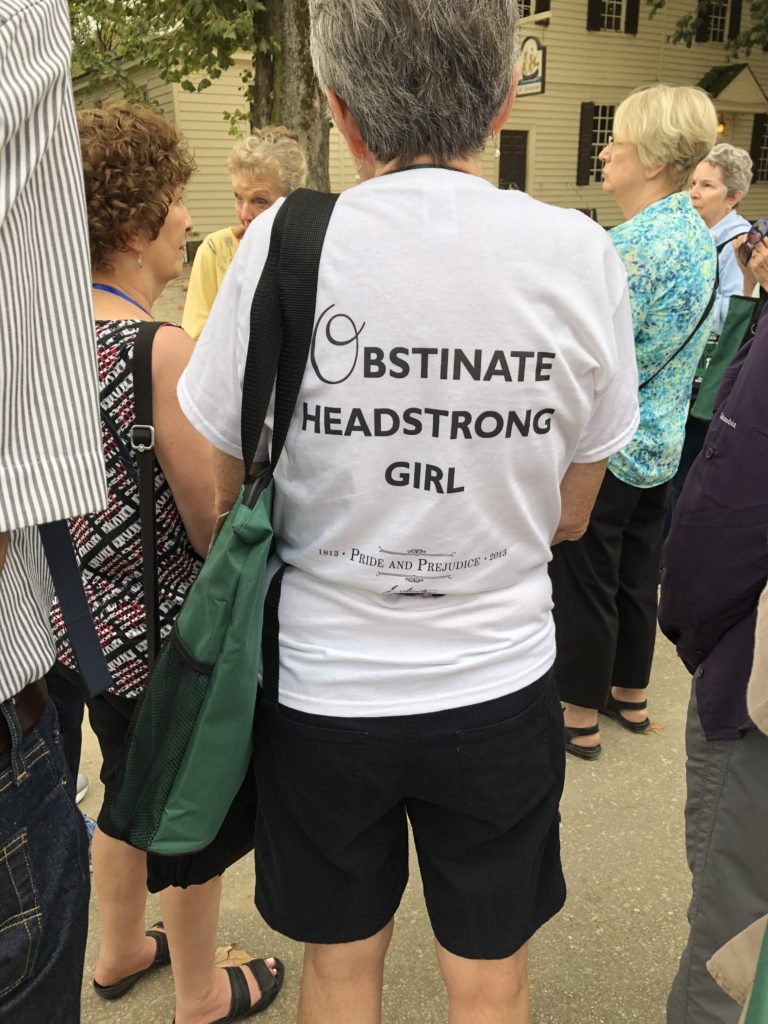
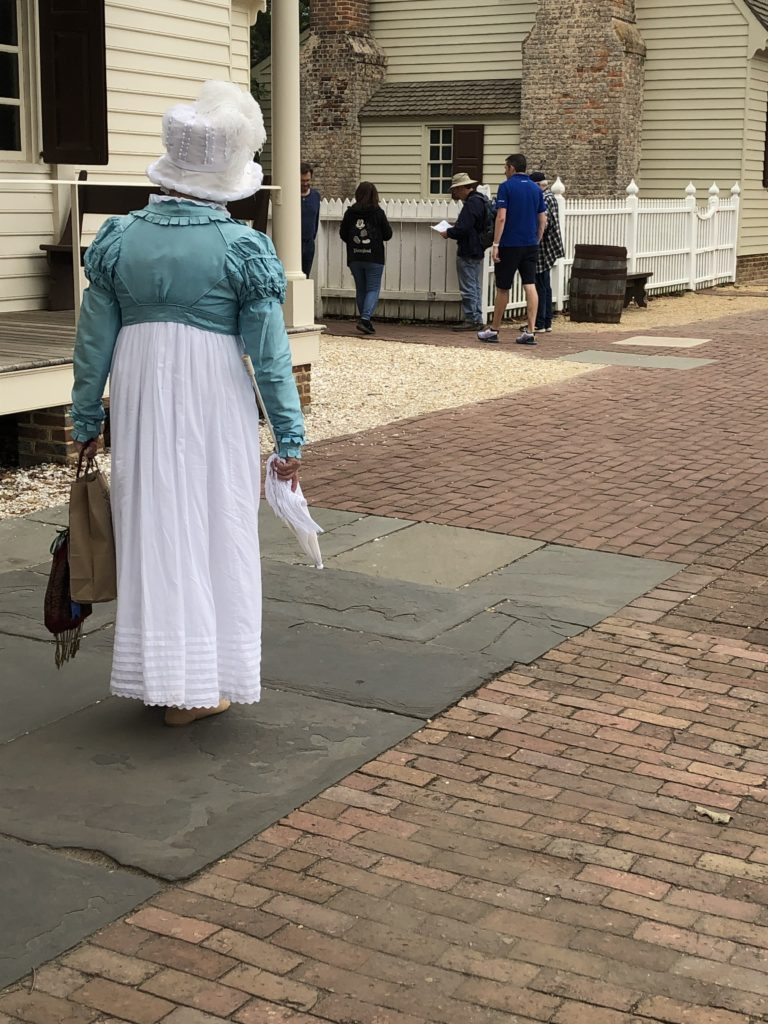
—On the final afternoon, there was an 18th century cricket demonstration. The rules were somewhat different then than in modern cricket! (the largely north American audience might not have been as aware of differences). And in case you are wondering that the photo shows a woman playing, Austen tells us that Catherine Morland, heroine of Northanger Abbey (the novel on which this year’s conference focused) loved cricket as a girl and played it with her brothers!
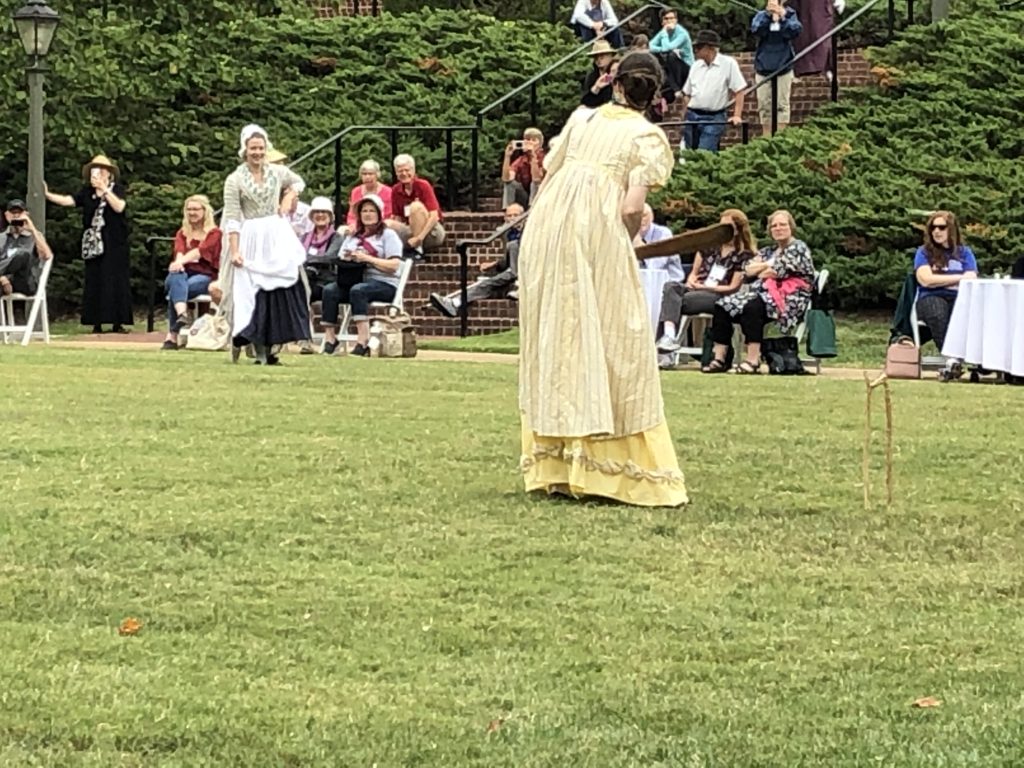
Intrigued? If you haven’t read any Jane Austen, or if you tried as a teenager and couldn’t warm to it, maybe have another look… Here is a complete set, free and online, from the wonderful Project Gutenberg. For introductions to her life and work, try Jane Austen (with an introduction by Harold Bloom), or The Cambridge Introduction to Jane Austen. And for more reading on Jane Austen devotees, try Among the Janeites or The Making of Jane Austen. For a video of a spirited debate comparing Jane Austen and Emily Brontë, check out this one from IntelligenceSquared. And consider joining us at the JASNA 2020 AGM next year in Cleveland!
*The term Janeite is often not used as a compliment; see this decidedly non-neutral Wikipedia overview. However, for the purposes of this article, the term is used affectionately!
The Versatility Chronicles: Hilary Schiraldi, Berkeley Librarian and Powerlifter
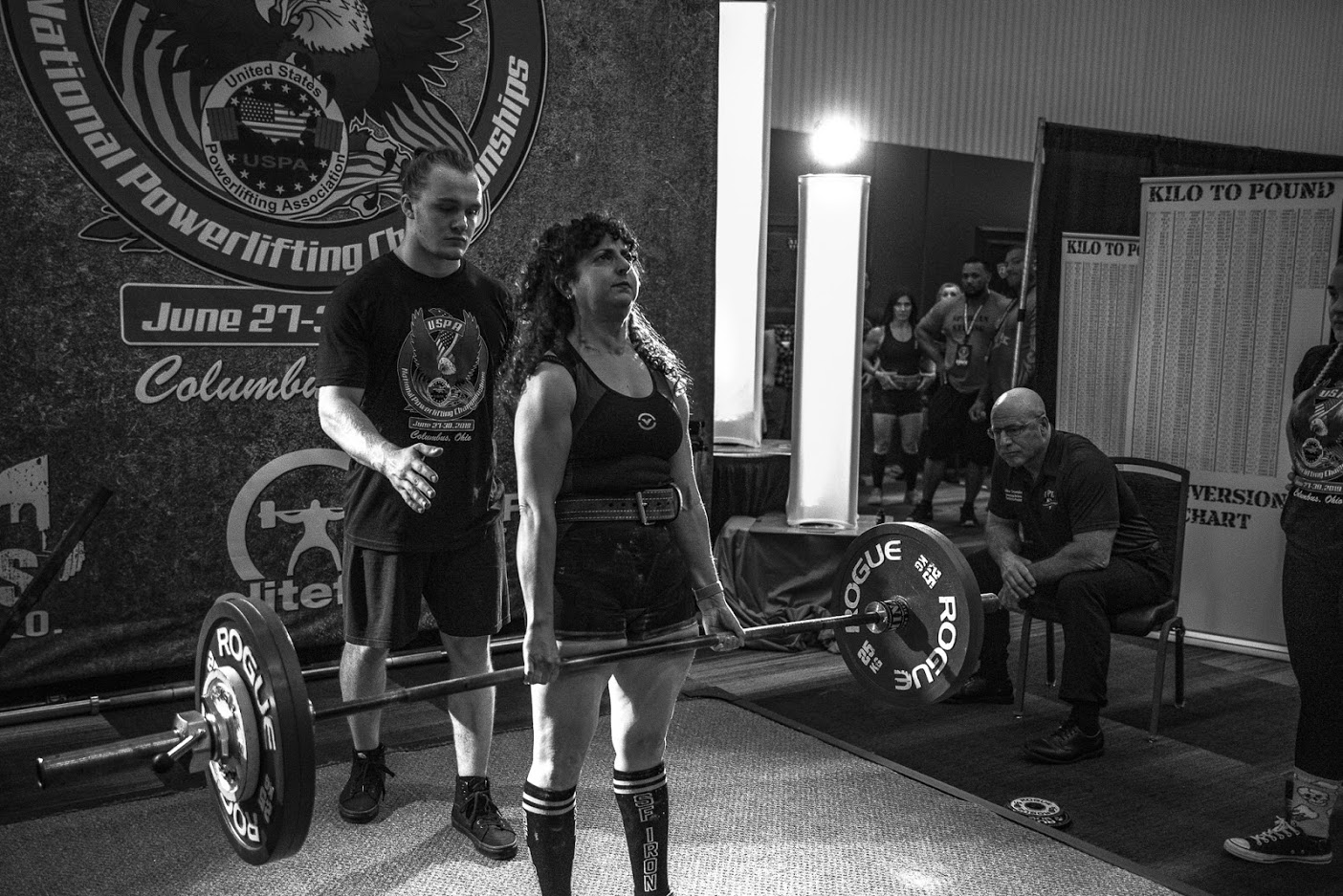
Library staff are just about the most intellectually curious people there are, and with social sciences being such an interdisciplinary scholarly endeavor, you’d expect people from our division to have diverse interests outside of the workplace as well as in. Watch this space– we’ll occasionally be highlighting some of the non-workplace pursuits of our versatile workforce, starting with the amazing Hilary Schiraldi. In addition to being a Business Librarian in the Social Sciences Division, she is a nationally ranked powerlifter in her age/weight class.
Hilary came to powerlifting (not the same as the weightlifting events we see in the Olympics, or Strongman, or bodybuilding, or even Highland Games) early. She realized in high school that she enjoyed working with weights, and at Berkeley she actually started teaching herself basic powerlifting by taking a class with Cal’s Rec Sports, joining the Rec Sports Facility, and (natch, she’s a librarian!) reading a book. But her practice changed direction when she had a little time to kill in the neighborhood South of Market in SF, and she found a barbell gym, SF Iron, and her new coach, Scott Kaplan.
With coaching, she really took off, and after doing several local competitions, eventually qualified to go to the USPA National Powerlifting, Benchpress and Deadlift Championships in Columbus, OH at the end of June. In the event, Hilary participated in three different types of lifts: the bench press and deadlift as you’d expect from the event title, and also the squat (here’s a good overview of what’s involved in these lifts). In each case, she lifted different sets of weights with different techniques (and luckily using different sets of muscles too, since all of her lifts happened on the same day). She had three attempts to lift (and increase the weight at each attempt) for each event. In the end, she was pleased with how she did, achieving her first attempt at the benchpress (darn it, her rear end lifted from the bench on the second attempt), her second attempt at the squat, and all the way to her third attempt at the deadlift, lifting 137.5 kg/303 lbs., a personal best. This meant she was third nationally in her age/weight class, earning a spot on the podium!
Like any world where people pursue a passion, powerlifting has communities and a culture of its own, and it’s one in which Hilary thrives (although she did enter another world in Columbus, making scented candles the day before she competed). It’s fascinating to listen to her talk about her experiences, and if you want to hear and see more, check out her Instagram account at hil_schi (also if you really want to follow in her footsteps, her coach is @the_kaplan_method and her gym is @sf_iron). And maybe consider learning to lift yourself? It’s great for your bones and musculature, especially your stabilizing muscles. Competing in all three events Hilary did is called full power, and who doesn’t want that? Here’s to versatility, and work-life balance, and Hilary’s FULL POWER!
